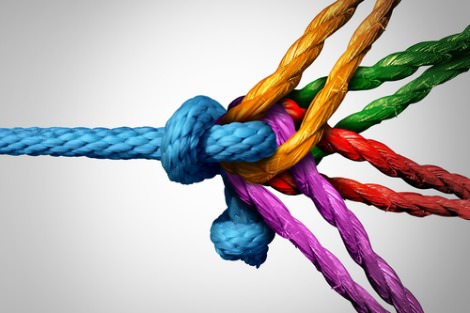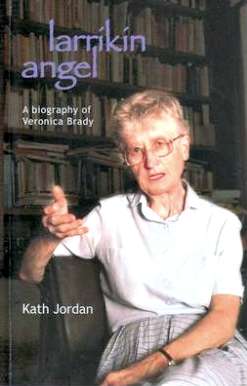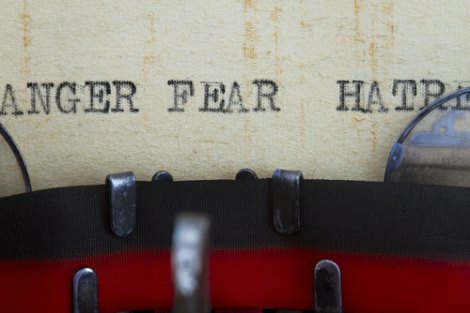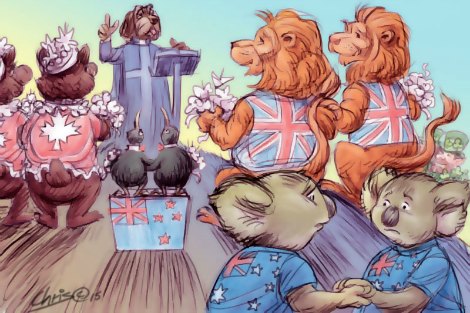Keywords: Irish
There are more than 200 results, only the first 200 are displayed here.
-

AUSTRALIA
- Irfan Yusuf
- 25 January 2016
11 Comments
I arrived in Australia at the ripe old age of five months. I learned Australian values by a process of gentle osmosis. Many Indigenous Australians learned these values in a less gentle fashion. Today, many Australian Jews show a strong loyalty to the world's only Jewish state. Others combine loyalties with other ancestral homelands. Australian Muslims, Catholics, Buddhists and Hindus have similar broadened loyalties. Exactly how such loyalties make them any less Australian beats me.
READ MORE 
-

AUSTRALIA
- Frank Brennan
- 10 December 2015
I first met this Tony on my regular visits here to Darwin when he was working at the North Australian Aboriginal Legal Aid Service and then when he set up the mediation services under the auspices of Anglicare. In later years I knew him when he was your Anti-Discrimination Commissioner. He was a quiet, considered, gentle, strong and principled man. On Human Rights Day, it is only fitting that I honour Tony by offering some reflections on the architecture for human rights in Australia, on the contemporary human rights controversies, and on the way forward for better protection of the human rights of Aborigines and asylum seekers, two marginalised groups who had a special claim on Tony's sympathies.
READ MORE
-

AUSTRALIA
- Morag Fraser
- 02 September 2015
8 Comments
Veronica was one of Phillip Adams' 'favourite Catholics'. He likes larrikins, mavericks, with a mind of their own. Last week I sat in my car and listened to the replay of an interview Phillip did with Veronica some years back. I could not predict what she was going to say next, even as I recognised certain characteristic speech habits. There is the touch of the nun-teacher there, but don't mistake it for complacency.
READ MORE 
-

EUREKA STREET TV
- Peter Kirkwood
- 05 August 2015
13 Comments
'The question for me is: Is the Catholic Church at it's most authentic when it is covering up child abuse?' asks Adam Brereton, opinion editor for The Guardian Australia. Eureka Street TV's Peter Kirkwood talks to Catholic convert Brereton and 'cradle Catholic' Gerladine Doogue about the effect that the Royal Commission into Institutional Responses to Child Sexual Abuse is having on Australian believers.
READ MORE 
-

- Frank Brennan
- 08 July 2015
3 Comments
I suspect Pope Francis had some of our Jesuit alumni in mind when he wrote in his encyclical Laudato Si: 'A politics concerned with immediate results, supported by consumerist sectors of the population, is driven to produce short-term growth... True statecraft is manifest when, in difficult times, we uphold high principles and think of the long-term common good. Political powers do not find it easy to assume this duty'.
READ MORE
-

- Greg O'Kelly
- 01 July 2015
3 Comments
The phrase 'the public square' is peppered throughout Frank Brennan's work. The 1988 film Cinema Paradiso depicts the public square in a Sicilian village over 30 or so years, and its slow and subtle change from a place where human beings gather to laugh, play and discuss. Billboards and garish signs appear and it becomes a car park bereft of its humanity.
READ MORE
-

- Sean McManus
- 25 June 2015
4 Comments
As much as any other religious figure in Australia, Frank Brennan has maintained a religious perspective while engaging in issues of ethics and justice in contemporary Australia. His book Amplifying that Still Small Voice emphasises the importance of the 'religious sense that the human person is created in the image and likeness of God', while speaking in the language and terms that are understandable to the public square.
READ MORE
-

AUSTRALIA
- Andrew Hamilton
- 11 June 2015
30 Comments
In my early years of secondary school there was a fine footballer in the senior team of another school. I had never met him, but I hated him with a passion. This memory returned in recent weeks when reading of the vilification of Adam Goodes, and some of the opinion pieces on the Ballarat sexual abuse. Hatred avoids questions by trying to obliterate those whose lives pose them to us.
READ MORE 
-

- Paul Bongiorno
- 09 June 2015
9 Comments
'In discussing Australia's asylum seeker policies Frank laments the government's deaf ear to calls from the churches, his own included, for a greater measure of compassion and a better way of dealing with the issue of boat people. Frank wryly comments: 'If only the Abbott Government with its disproportionate number of Jesuit alumni cabinet ministers could listen.' Paul Bongiorno launches Fr Frank Brennan SJ's book Amplifying That Still, Small Voice at the Australian Centre for Christianity and Culture, Canberra, 8 June 2015.
READ MORE
-

AUSTRALIA
- Andrew Hamilton
- 04 June 2015
60 Comments
The Vatican Secretary of State's post-Irish referendum comment refers to the Church's understanding of the privilege given by society to lasting heterosexual marriage reflecting the social good of the institution. But the heaviest defeats for humanity come from government policies that focus on the individual, ignore the needs of those raising children, and penalise the disadvantaged.
READ MORE 
-

AUSTRALIA
- John Warhurst
- 01 June 2015
71 Comments
Whatever one's position on the introduction of same sex marriage, it's clear that Australia now lags well behind the Western world, including many comparable countries such as the UK and New Zealand. This contrasts with 120 years ago around the time of Federation, when Australia was a leader on issues such as votes for women, other democratic reforms such as the secret ballot, and a living wage. Our country is now a laggard.
READ MORE 
-

AUSTRALIA
- Gerry O'Hanlon
- 27 May 2015
56 Comments
Archbishop Martin voted no in the gay marriage referendum. But after the result, he says the Church needs ‘a reality check across the board’, and that means more than a new language. When Church teaching is invoked to bar women from office, to forbid contraception and condemn homosexual relations as intrinsically disordered in a way that conflicts with the ‘sense of the faithful’ of so many of the baptised, then the Church, despite the many wise things it has to say, loses credibility.
READ MORE 